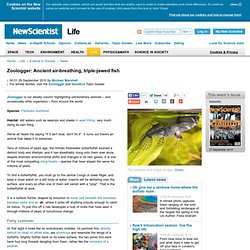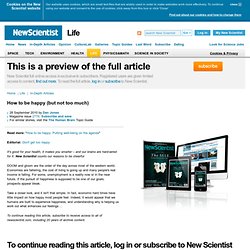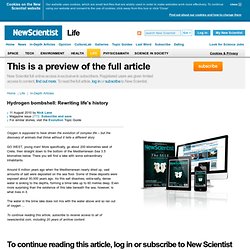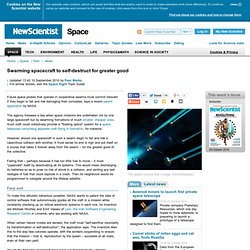

My New Scientist - Registered user - New Scientist. Cookies on the New Scientist website close Our website uses cookies, which are small text files that are widely used in order to make websites work more effectively.

To continue using our website and consent to the use of cookies, click away from this box or click 'Close' Find out about our cookies and how to change them Log in Your login is case sensitive I have forgotten my password close My New Scientist Look for Science Jobs Login Your password is case sensitive Remember me help Forgotten your password? Access of newscientist.com There are three levels of access to newscientist.com: Not registered Visitors to the website who do not register receive access to blogs and limited news articles. Zoologger: Ancient air-breathing, triple-jawed fish - life - 29 September 2010. Zoologger is our weekly column highlighting extraordinary animals – and occasionally other organisms – from around the world Species: Pantodon buchholzi Habitat: still waters such as swamps and creeks in west Africa, very much doing its own thing We've all heard the saying "If it ain't bust, don't fix it".

It turns out there's an animal that takes it to extremes. Tens of millions of years ago, the African freshwater butterflyfish evolved a distinct body and lifestyle, and it has steadfastly clung onto them ever since, despite dramatic environmental shifts and changes in its own genes. To find a butterflyfish, you must go to the central Congo or lower Niger, and keep a close watch on a still body of water.
It is a surface hunter, shaped by evolution to hover just beneath the boundary between water and air , where it picks off anything unlucky enough to catch its notice. Fishy customer At first sight it looks like an evolutionary mistake. Living fossil More From New Scientist Promoted Stories. How to be happy (but not too much) - 22 September 2010. Read more: "How to be happy: Putting well-being on the agenda" Editorial: Don't get too happy It's good for your health, it makes you smarter – and our brains are hard-wired for it.

New Scientist counts our reasons to be cheerful DOOM and gloom are the order of the day across most of the western world. Economies are faltering, the cost of living is going up and many people's real income is falling. Take a closer look, and it isn't that simple. Hydrogen bombshell: Rewriting life's history - life - 11 August 2010. Oxygen is supposed to have driven the evolution of complex life – but the discovery of animals that thrive without it tells a different story GO WEST, young man!

More specifically, go about 200 kilometres west of Crete, then straight down to the bottom of the Mediterranean Sea 3.5 kilometres below. There you will find a lake with some extraordinary inhabitants. Around 6 million years ago when the Mediterranean nearly dried up, vast amounts of salt were deposited on the sea floor. Some of these deposits were exposed about 30,000 years ago. The water in the brine lake does not mix with the water above and so ran out of oxygen ...
Swarming spacecraft to self-destruct for greater good - space - 06 September 2010. Future space probes that operate in cooperative swarms must commit hara-kiri if they begin to fail and risk damaging their comrades, says a recent patent application by NASA.

The agency foresees a day when space missions are undertaken not by one large spacecraft but by swarming formations of much smaller, cheaper ones. Such craft could collectively provide a "floating optics" system for a space telescope comprising separate craft flying in formation, for instance. However, should one spacecraft in such a swarm begin to fail and risk a calamitous collision with another, it must sense its end is nigh and put itself on a course that takes it forever away from the swarm – for the greater good of the collective. Failing that – perhaps because it has too little fuel to move – it must "passivate" itself by deactivating all its systems.
This would mean discharging its batteries so as to pose no risk of shock in a collision, and venting any last vestiges of fuel that could explode in a crash. Courgettes, judo throws and bear attacks on humans.